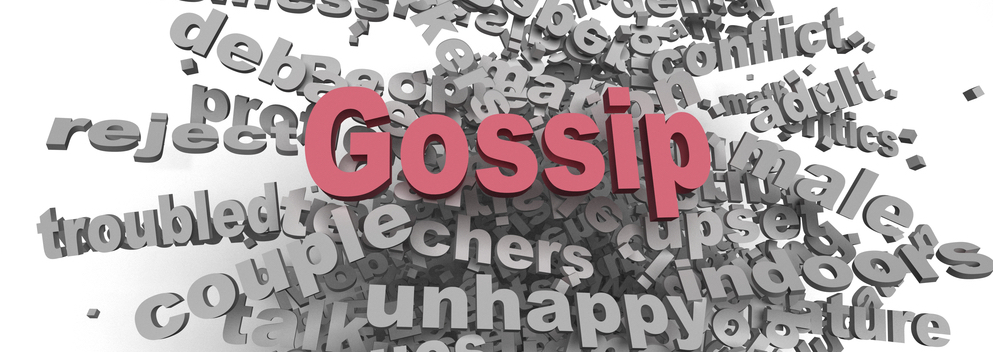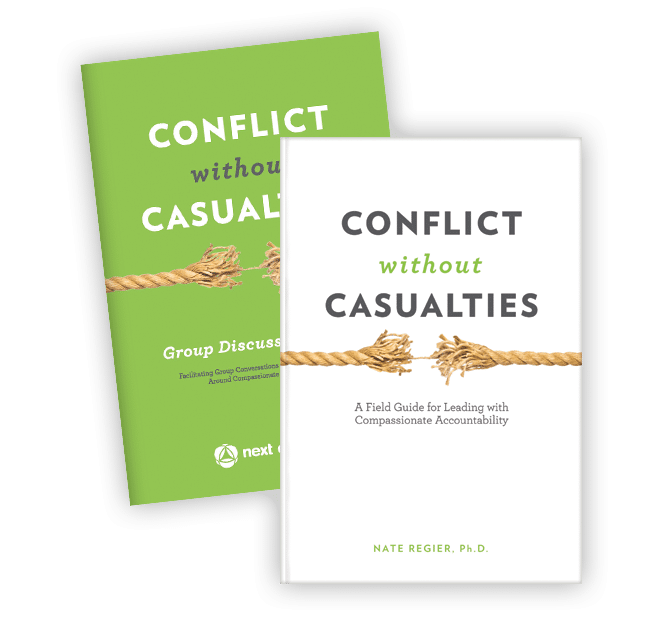
How To Stop Gossip In Four Easy Steps
Share viaAlmost universally when we ask people about gossip, they agree that it’s harmful, agree that they should stop, but admit that they aren’t confident knowing what to do about it.
Gossip is any activity where people try to get others to justify or support them in avoiding healthy conflict.
Top situations where gossip happens
- People aren’t honest about their feelings and ideas during a meeting, but spend time complaining to others after the meeting.
- People seek sympathetic ears to support their negative feelings or beliefs about someone but don’t deal directly with the problem.
- People use social media to recruit others to their camp.
How gossip damages relationships and companies
- Energy is wasted in self-justification instead of problem-solving
- Necessary, healthy conflict is avoided, so opportunity is lost
- Resentment builds up over time, leading to broken relationships
- Productivity and innovation suffer
- The workplace becomes increasingly toxic
Two truths about gossip that will increase your compassion
- Gossip reveals real frustrations around not getting what we want; respect, opportunity, dignity, etc. The problem isn’t that we have difficult and negative feelings, it’s how we act on these feelings that makes all the difference.
- Gossip is drama, meaning that it involves the mis-use of conflict towards destructive behaviors rather than constructive ones.
If you’d like to stop participating in gossip and invite those around you to do the same, here’s a simple application of our Formula Compassionate Conflict you can follow to help you know what to say. Use it on yourself to stay clear of gossip, or use it on others to stop gossip in its tracks. Compassionate Conflict involves a series of statements that are Open, Resourceful, Persistent, and Open:
The Formula for Compassionate Conflict: CC = O-R-P-O
Open: Identify and share your feelings about gossiping. Alternatively, empathize with the uncomfortable feelings in the other person without endorsing their behaviors.
Resourceful: Offer to be a resource for healthy problem-solving without expecting the person to change and without giving them unsolicited advice.
Persistent: Reinforce your boundaries around what you will and won’t do. Avoid ultimatums or threats.
Open: Show you care, show transparency, and demonstrate that you aren’t here to judge the other person.
Using The Formula On Yourself
Here are some examples of corrective self-statements that help get you back on track and avoid gossip.
“I am frustrated because I can’t get anyone to pay attention to my proposal at staff meeting. I will talk to several of the main influencers before the meeting and ask them for suggestions. I am committed to being heard because I think I have something to contribute. I care about me.”
“I feel angry because Debbie didn’t include me in an e-mail and I wonder if they are talking about me behind my back. I can check with Debbie about it before jumping to conclusions. I am committed to open, transparent relationships and will do my part to model that. I am apprehensive about what will happen but I feel good not participating in gossip.”
“I am scared about what will happen if I speak up. I want to feel heard so I will ask for advice and support from people I trust. I won’t ask them to take sides or blame anyone. I know I will feel good about myself if I keep things positive.”
Using the Formula with Others
When faced with gossip from another person, it is often difficult to know what to say in the moment. Here are some examples you can try.
“I am uncomfortable hearing you complain about Debbie when she isn’t here. I’m willing to help you problem-solve your situation with her if you want. I’m not willing to talk about her behind her back. I care about both of you.”
“I understand how hard it is to not have your feelings heard. I am here for you if you want to explore solutions to get what you want. My boundary is to help in ways that keep everybody in the loop. How does that sound to you?”
“I am worried about where this conversation is going because I want to be part of the solution. I am happy to talk about what we can do differently. I’m not willing to keep rehashing what others have done wrong. I feel better about myself with these boundaries.”
The Formula for Compassionate Conflict is a powerful template to engage in healthy conflict while preserving the dignity of all involved. Here’s a story of how someone used this formula to get closure on a job application.
Copyright 2016, Next Element Consulting, LLC
 Get our latest book Conflict Without Casualties: A Field Guide for Leading With Compassionate Accountability. This book is the foundation for our Leading Out of Drama program, a comprehensive system for building cultures of compassionate accountability.
Get our latest book Conflict Without Casualties: A Field Guide for Leading With Compassionate Accountability. This book is the foundation for our Leading Out of Drama program, a comprehensive system for building cultures of compassionate accountability.
![]() Subscribe to Dr. Regier’s free podcast
Subscribe to Dr. Regier’s free podcast
Book Your Next Keynote Speaker

Author and Co-founder of Next Element, Dr. Nate Regier is available to speak at your upcoming event.
Submit a Speaker RequestPodcast: Listen to Nate "On Compassion"
 Listen to the Podcast
Listen to the Podcast



1 Comments
Thanks, Nate! I’m adding this article to me teachers’ Back to School Orientation packet. ????
Fantastic, Joe. Glad to help.
Add comment
Add comment
Add comment